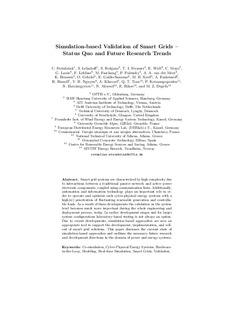| dc.contributor.author | Steinbrink, Cornelius | |
| dc.contributor.author | Lehnhoff, Sebastian | |
| dc.contributor.author | Rohjans, Sebastian | |
| dc.contributor.author | Strasser, Thomas I. | |
| dc.contributor.author | Widl, Edmund | |
| dc.contributor.author | Moyo, Cyndi | |
| dc.contributor.author | Lauss, Georg F. | |
| dc.contributor.author | Lehfuss, Felix | |
| dc.contributor.author | Faschang, Mario | |
| dc.contributor.author | Palensky, Peter P. | |
| dc.contributor.author | van der Meer, Arjen A. | |
| dc.contributor.author | Heussen, Kai | |
| dc.contributor.author | Gehrke, Oliver | |
| dc.contributor.author | Guillo-Sansano, E. | |
| dc.contributor.author | Syed, Mazzheruddin Hussain | |
| dc.contributor.author | Emhemed, Abdullah | |
| dc.contributor.author | Brandl, Ron | |
| dc.contributor.author | Nguyen, Van Hoa | |
| dc.contributor.author | Khavari, Ali M. | |
| dc.contributor.author | Tran, Quoc Tuan | |
| dc.contributor.author | Kotsampopoulos, Panos C. | |
| dc.contributor.author | Hatziargyriou, Nikos | |
| dc.contributor.author | Akroud, Nabil | |
| dc.contributor.author | Rikos, Evangelos J. | |
| dc.contributor.author | Degefa, Merkebu Zenebe | |
| dc.date.accessioned | 2018-02-23T11:46:52Z | |
| dc.date.available | 2018-02-23T11:46:52Z | |
| dc.date.created | 2017-09-11T09:37:21Z | |
| dc.date.issued | 2017 | |
| dc.identifier.citation | Lecture Notes in Computer Science. 2017, 10444 LNCS 171-185. | nb_NO |
| dc.identifier.issn | 0302-9743 | |
| dc.identifier.uri | http://hdl.handle.net/11250/2486724 | |
| dc.description.abstract | Smart grid systems are characterized by high complexity due to interactions between a traditional passive network and active power electronic components, coupled using communication links. Additionally, automation and information technology plays an important role in order to operate and optimize such cyber-physical energy systems with a high(er) penetration of fluctuating renewable generation and controllable loads. As a result of these developments the validation on the system level becomes much more important during the whole engineering and deployment process, today. In earlier development stages and for larger system configurations laboratory-based testing is not always an option. Due to recent developments, simulation-based approaches are now an appropriate tool to support the development, implementation, and roll-out of smart grid solutions. This paper discusses the current state of simulation-based approaches and outlines the necessary future research and development directions in the domain of power and energy systems. © Springer International Publishing AG 2017 | nb_NO |
| dc.language.iso | eng | nb_NO |
| dc.rights | Navngivelse 4.0 Internasjonal | * |
| dc.rights.uri | http://creativecommons.org/licenses/by/4.0/deed.no | * |
| dc.title | Simulation-based validation of smart grids – Status quo and future research trends | nb_NO |
| dc.type | Journal article | nb_NO |
| dc.type | Peer reviewed | nb_NO |
| dc.description.version | acceptedVersion | nb_NO |
| dc.rights.holder | Springer | nb_NO |
| dc.source.pagenumber | 171-185 | nb_NO |
| dc.source.volume | 10444 LNCS | nb_NO |
| dc.source.journal | Lecture Notes in Computer Science | nb_NO |
| dc.identifier.doi | 10.1007/978-3-319-64635-0_13 | |
| dc.identifier.cristin | 1492531 | |
| dc.relation.project | EC/H2020/654113 | nb_NO |
| cristin.unitcode | 7548,50,0,0 | |
| cristin.unitname | Energisystemer | |
| cristin.ispublished | true | |
| cristin.fulltext | postprint | |
| cristin.qualitycode | 1 | |

